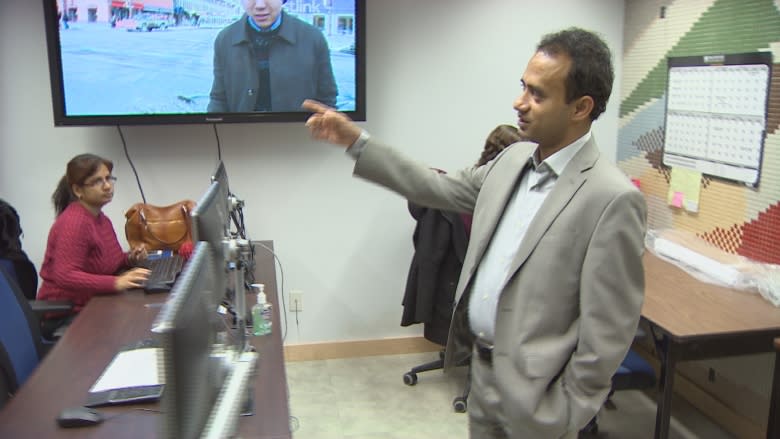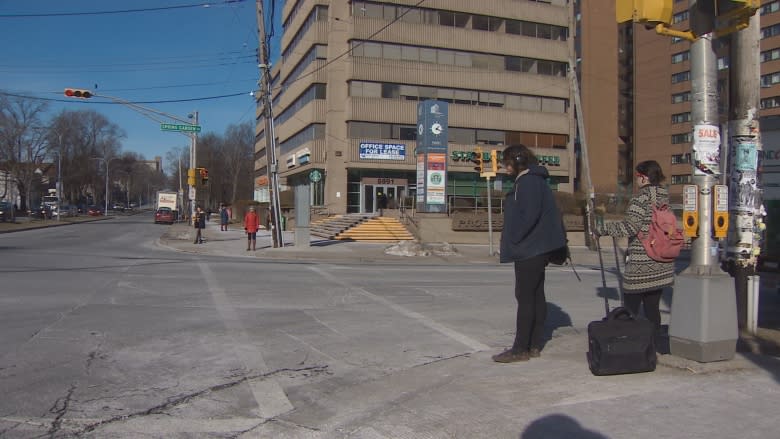Distracted walking ban debate strolls into Halifax
Halifax and Nova Scotia are joining a growing number of Canadian jurisdictions where a ban on "distracted walking" is being debated.
The Crosswalk Safety Society is completing a report it hopes to bring to Halifax city hall this week, detailing results from an informal online survey on road safety. It will also send the same report to the province and police.
One of the hottest issues in the survey was a question about whether there should be a law against crossing the street while using a handheld device, similar to distracted driving laws.
"I personally am in favour of legislation that would treat the pedestrian on our roadways the same. We're not talking sidewalks, we're talking while you're on the public roadway," said Norm Collins, the president of the society.
No data to analyze
Ahsan Habib, an associate professor at Dalhousie University's school of planning, has been studying aspects of transportation like distracted walking and driving for six years with the Dalhousie Transportation Collaboratory (DalTRAC).
"I think there is a legitimate issue of distracted walking," said Habib.
He said other transportation planners and engineers he knows also share his concerns, but he needs more data.
"We don't know yet how much, the magnitude of it, what is the effect of it? But we all have some sort of a consensus it's a concern, a serious concern for pedestrian safety," he said.
DalTRAC did analyze 74,000 Nova Scotian records of incidents between 2004 and 2011 and concluded four per cent of car-pedestrian crashes occurred because of distracted walking.
The DalTRAC study did not differentiate between smartphones and other types of distractions.
The latest numbers from Halifax Regional Police showed 183 car-pedestrian collisions from the beginning of 2016 to December. In the same period in 2015, there were 176.
Injuries by the numbers
The Nova Scotia Trauma Registry tracks hospital admissions province-wide, capturing more serious injuries that could not be treated at the scene of the crash.
Registry numbers showed 69 hospitalized pedestrian injuries in 2015-2016, a slight increase from the previous year when there were 65.
Of those injuries there were 44 pedestrians who had major trauma; seven of them died. Even non-fatalities can be life-changing injuries, according to Dr. Robert Green, the medical director of the Trauma Registry.
"Significant broken bones, internal injury, traumatic brain injury. The collision between a pedestrian and a motor vehicle is certainly unforgiving and there's lots of damage that can and does happen," Green said.
Green said he's concerned about people walking while using devices. He's not aware of any Canadian studies, but has looked at research from the U.S.
"Distracted walking, the literature is very clear that it is associated with increased risky behaviour — crossing streets — and increase in injuries," he said.
Overall, however, the rate of pedestrian injury in Nova Scotia has been fairly steady in the last five years.
Injuries that required hospital admission occurred at a rate of between 3.5 and 4.7 per 100,000 people, for the years between 2011 and 2016.
"I think there needs to be more investigation around the problem," Green said, suggesting more public awareness campaigns before laws be changed. "We just don't know enough about it right now."
Cities explore bans
Cities across Canada are considering "distracted walking" bans. Calgary, Vancouver and Toronto have all explored the issue, but so far none have implemented a ban.
"A number of people will say this is an attack on pedestrians, it's trying to put the blame on pedestrians," said Collins. "It's clearly not that, at least not in my view. In my view, the sole purpose and goal of any legislation and the enforcement of that, should be to reduce the number of collisions."
Collins said he believes a ban would be difficult to enforce, but noted people, including members of his family, reconsidered how they used their phones when distracted driving bans were imposed.
"We changed our habit. We changed our behaviour, and I of course don't use the cellphone while I'm driving. And I think it's the same thing here."
Habib said he would be in favour of a ban, for the same reasons.
"Yes, the lion's share of the responsibility goes to the drivers. But there is a legitimate concern [that] pedestrians, cyclists, other vulnerable users also be very alert," he said.
A move to regulate acts on public roadways would fall under the province's jurisdiction.





